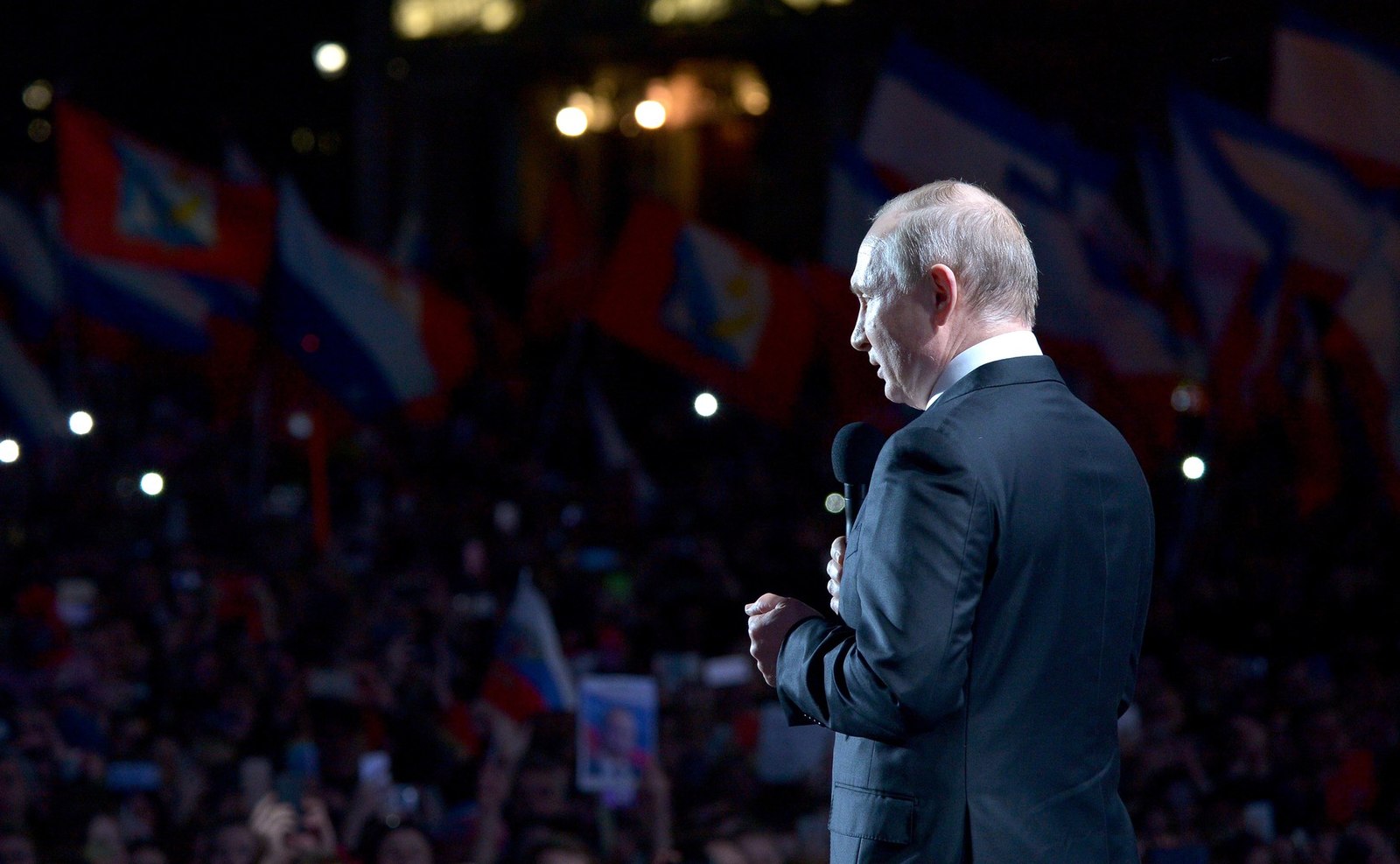
Vladimir Putin rally in Sevastopol on 14 March 201
Image: Wikimedia Commons/Kremlin RU
By Jacob Bosen
A year after Russia’s brutal invasion of Ukraine, many analysts are reflecting on why Russia invaded and what Ukraine and others can do to counter the aggression. Much attention has been paid to Russian President Vladimir Putin’s miscalculation after Ukraine has shown its ability to fend off much of the Russian advances, but many have not considered what Putin could have done to outmaneuver the West. Russia could have led the United States intelligence services to believe it was planning a full-scale invasion, let these services continually claim an impending attack, and then completely pull back its military build-up and label its activities as an exercise. If Putin had calculated correctly, he would have engaged in political warfare against the United States to destroy the credibility of U.S. intelligence services and better serve his aims in Ukraine in the long run.
During the Cold War, the Soviet Union engaged the United States through what it termed active measures. Active measures were meant to “weaken the West, to drive wedges in the Western community alliances of all sorts, particularly NATO, to sow discord among allies, to weaken the United States in the eyes of the people of Europe, Asia, Africa, Latin America, and thus to prepare [the] ground in case the war really occurs. To make America more vulnerable to the anger and distrust of other peoples,” as described by retired Committee for State Security (KGB) Major General Oleg Kalugin. For example, the Soviets attempted to create distrust of U.S. intelligence by claiming to show that the Central Intelligence Agency had successful and unsuccessful assassination attempts on multiple heads of state in the Middle East.
U.S. intelligence services released reports as early as November 2021 showing Russian plans to invade Ukraine. The Department of State and President Joe Biden addressed the American people, and the world, several times before Russia’s invasion and consistently labeled Russia’s build-up on the Ukrainian border as an imminent threat. A series of announcements convinced the majority of Americans and scholars that Russia would attack within the coming weeks. For weeks, the world was on edge waiting for Russia’s invasion, and some started to question the claims of the United States. All the while, Russia was pushing a different story.
Prior to its invasion, Russia frequently denied that it had plans to invade Ukraine. This denial created a battle of who could control the narrative between Russia and the West while the world waited to see who would be discredited. After Russia invaded Ukraine, its invasion gave the United States intelligence services credibility among the American people and the world, only strengthening the confidence in the United States intelligence services. The unfolding events hurt Russia’s long-term strategy against the West.
Russia had the perfect opportunity to engage in long-term political warfare that would have incited further distrust among the American people toward their government. Not only would this have impacted the American people but allies of the United States would have questioned the credibility of United States intelligence services. Further, Russia would have been able to push the argument that it is, in fact, the United States that is seeking conflict with Russia and that the United States is the real threat to international stability by spreading false rumors about a major power. Russia could have labeled itself a victim of United States aggression and emerged as the truth-teller by not moving forward with the invasion. All things considered, Russia could have used the response of the United States as a tool for propaganda. This strategy would have not only secured further the confidence of the Russian people in the Putin regime but would also have improved the perception of Russia by Americans.
Putin’s long-term strategy for Ukraine would have been better served by slowly wearing down confidence in U.S. intelligence services and allowing Ukraine to escalate its civil war against separatists in the Donbas region. If Russia practiced more prudence, it would have had a better chance of emerging as a liberator and a victim of Western aggression. Instead, Russia is stuck with Ukraine in a stalemate war of attrition, a drained military, Western sanctions, and a worsening of its relationship with China as its top strategic partner.
Russia missed an opportunity by not utilizing the same tactics that the Soviet Union frequently deployed during the Cold War known as active measures. Political warfare and protracted conflict should have been Russia’s choice of weapons against the United States and Ukraine, not direct military conflict. Reasons for Russia’s invasion aside, Russia did not make a strategic move at the right time. Putin miscalculated and Russia missed its shot. It’s now paying the price.
Jacob Bosen is a graduate student of statecraft and international affairs at the Institute of World Politics. He participated in the Russian American Cooperation Initiative in Moscow in December 2021


Leave a Reply